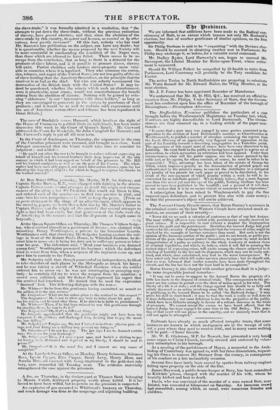At Bow Street Office, yesterday, Mr. Martin, M.P. for Galway,
and Captain Ryder Burton, TIN., were charged with fighting in the streets. Captain nurtoa made several attempts to detail the origin and circum- stances of the affeay ; but Sr -Frederick Roe would not listen to him, and ordered each of the combat:tots to find two sureties in 2501., and enter into his own recognizant:es i 500/. to keep the peace. [From an ex paste statement in the shape of an advertisement, which appears in the morning papers, we learn that a debt due by Mr. Martin's father to Captain Burtua N.-as the origin of the quarrel ; that several attempts to fight a duel had been male, but that gentlemen at the clubs were shy of interfering in the matter; and that the disputaats at length came to fistyeuffs.] • At the Queen Square Office, on Thursday, Mr. Thomas William Sedge- ley, who described himself as a gentleman of fortune, was charged with assaulting Henry Worthington, a private in the Grenadier Guards. Worthington said, that observing Mr.Sedgeley leaning against the rail- ings in front of Sir Robert Peel's [louse, in Whitehall Gardens, he de- sired him to move on ; it being his duty -not to suffer any person to loiter near his post. The defendant said, "Mind your business, you damned young fool." Worthington presented his bayonet ; which the defendant tried to wrest from him, when a sergeant of the regiment came up, and gave him in custody to the Police.
Mr. Seds,seley said. that, though possessed of an independence, he liked to take sketches of such places in the Metropolis as struck his fancy ; and he was taking a sketch of Whitehall Gardens when the soldier ordered bin to move on : he was not interrupting or annoying any- body : he certainly did try to wrest the weapon from his assailant : a crowd soon collected, and Sir Robert Peel expressed his regret that the sentinel had interfered. He denied that he used the expression " damned fool. The following dialogue tells the rest— Mr. White—" So far front this gentleman having committed an assault on the soldier, it is the very reverse."
Mr. Gregorie—" What all: the orders given to the sentinel in this respect ?" The Sergeant—" lie k nut to allow any hotly to loiter about his post. He has his orders, and he must obey them. If he don't he is liable to punishment." Mr. White—" Then, if he had been ordered to rim this gentleman through for standing there, he was to do it •sa The Sergelmt—" Oh, that's a different thing." Mr. Gregorie apprehended that the gentleman might not have been too temperate in the matter; and discharged him, desiring him to pay the usual fee, one shilling." Mr. Sedgeley—" Forgive me, Sir, but I intend to institute ulterior procesd- ings, awl your fining me a shilling may prevent my doing so." Mr. Gregoric—" I do not line you. The law says I ant to demand certain fees: this is one for vour discharge." Mr. Sedg.eley—" Them if I were a poor onii, and hadn't a shilling to pay for having been ill-treated and deprived us, my liberty, I should he sent to prison ?"
Mr. Gregorie—" It is the usual fee, and I cannot see any cause of complaint."
At the Lambeth Street Office, on Monday, Henry Solomons, Solomon Bees, Lewin Casper, Ellis ('asper, Sarah Levy, Henry Moss, and Amelia Mos::, all charged with being implicated in the gold-dust rob- bery, were remanded till Tuesday next. The evidence materially strengthened the case against the prisoners.


























 Previous page
Previous page